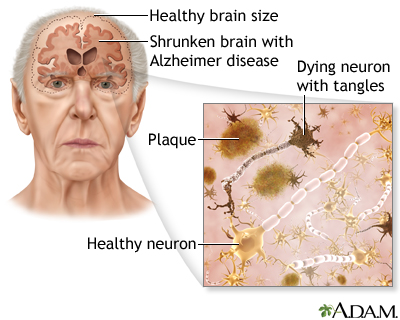Alzheimer's disease
Alzheimer's disease is a disorder of the brain that slowly destroys memory and thinking skills and, over time, the ability to perform even the simplest tasks. In most people with this disease, the first symptoms appear later in life.
Alzheimer's disease is named after Dr. Alois Alzheimer. In 1906, Dr. Alzheimer noticed changes in the brain tissue of a woman who had died of an unusual mental illness. Her symptoms included memory loss, language problems and unpredictable behavior. After she died, the doctor examined her brain and found many abnormal clumps (now called amyloid plaques) and tangles of tangled fibers (now called neurofibrillary tangles or tau tangles).
Even today, these plaques and tangles in the brain are considered to be among the main features of Alzheimer's disease. Another feature is the loss of connections between neurons in the brain. Neurons transmit messages between different parts of the brain and from the brain to the muscles and organs of the body.
Signs and symptoms of Alzheimer's disease:
Memory problems are often one of the first signs of cognitive decline related to Alzheimer's disease. Some people with difficulty remembering have a condition called mild cognitive impairment, in which they have more memory problems than normal for their age, but their symptoms do not interfere with their daily life. Movement difficulties and problems with the sense of smell have also been linked to mild cognitive impairment. Older people with this disorder are at increased risk for Alzheimer's disease, but not all develop it. Some may even return to normal cognition.
Stages of Alzheimer's disease
Mild Alzheimer's disease
Moderate Alzheimer's disease
Severe Alzheimer's disease
How is Alzheimer's disease treated?
Alzheimer's disease is complex and there is still no single drug or intervention that works for everyone. Still, in recent years, scientists have made tremendous strides in better understanding Alzheimer's disease and in developing and testing new treatments. While there is currently no cure for Alzheimer's disease, medications are emerging to treat the progression of the disease by targeting its underlying causes. There are also medications that can temporarily improve or stabilize memory and thinking skills in some people, and can help control certain symptoms and behavioral problems.
https://www.youtube.com/watch?v=v5gdH_Hydes
ALZHEIMER´S DISEASE PDF

.jpeg)

No hay comentarios.:
Publicar un comentario